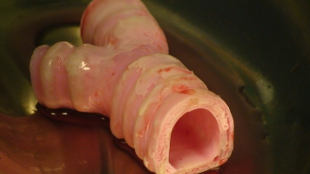 An artificial trachea, similar to those transplanted by Macchiarini, made by seeding an inorganic scaffold with stem cellsUCLThe long and winding saga of Paolo Macchiarini got another twist last week: the Karolinska Institute—where he has served as a visiting professor for several years—has found the artificial organ pioneer not guilty of scientific misconduct allegations made by colleagues years ago. On Friday (August 28) Anders Hamsten, vice chancellor of the institute, released a report clearing Macchiarini of misconduct in the cases of three patients who Macchiarini implanted with artificial tracheae—two of whom died. In May, independent investigator Bengt Gerdin of Uppsala University in Sweden, found Macchiarini guilty of misrepresenting key aspects of papers describing the surgical procedures such that readers were misled into thinking they were more successful than they actually were. “There were data in the papers that could not be found in the medical records,” Gerdin told ScienceInsider in May. The discrepancies constitute “a systemic misrepresentation of the truth that lead the reader to have a completely false impression of the success of the technique,” he said.
An artificial trachea, similar to those transplanted by Macchiarini, made by seeding an inorganic scaffold with stem cellsUCLThe long and winding saga of Paolo Macchiarini got another twist last week: the Karolinska Institute—where he has served as a visiting professor for several years—has found the artificial organ pioneer not guilty of scientific misconduct allegations made by colleagues years ago. On Friday (August 28) Anders Hamsten, vice chancellor of the institute, released a report clearing Macchiarini of misconduct in the cases of three patients who Macchiarini implanted with artificial tracheae—two of whom died. In May, independent investigator Bengt Gerdin of Uppsala University in Sweden, found Macchiarini guilty of misrepresenting key aspects of papers describing the surgical procedures such that readers were misled into thinking they were more successful than they actually were. “There were data in the papers that could not be found in the medical records,” Gerdin told ScienceInsider in May. The discrepancies constitute “a systemic misrepresentation of the truth that lead the reader to have a completely false impression of the success of the technique,” he said.
But the new report—performed by Karolinska officials and bolstered by new information provided by Macchiarini and others “that is critical to how the complaint is assessed,” according to Hamsten—rejects Gerdin’s findings, and clears the thoracic surgeon of wrongdoing in the cases.
Macchiarini told The New York Times that he was relieved that the Karolinska investigation exonerated him and that “justice has finally been done.” He said that the accusations against him were “extremely damaging: to me, to my team and to the whole field of regenerative medicine.”
But Macchiarini isn’t getting off scot-free. The Karolinska report mentioned that “certain circumstances that have arisen during the inquiry concerning Professor Macchiarini’s work show, however, that it does not meet the university’s high quality standards in every respect.” ...




















